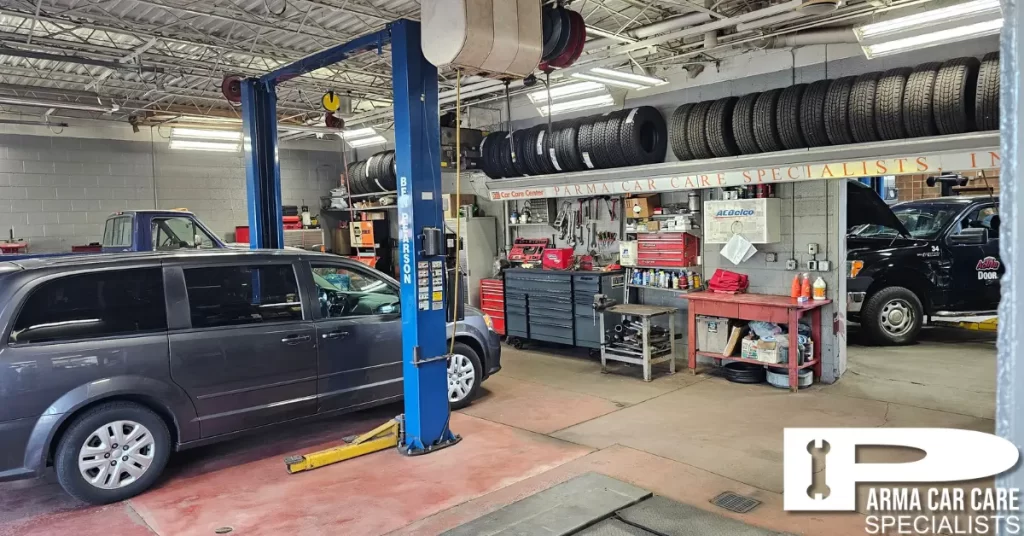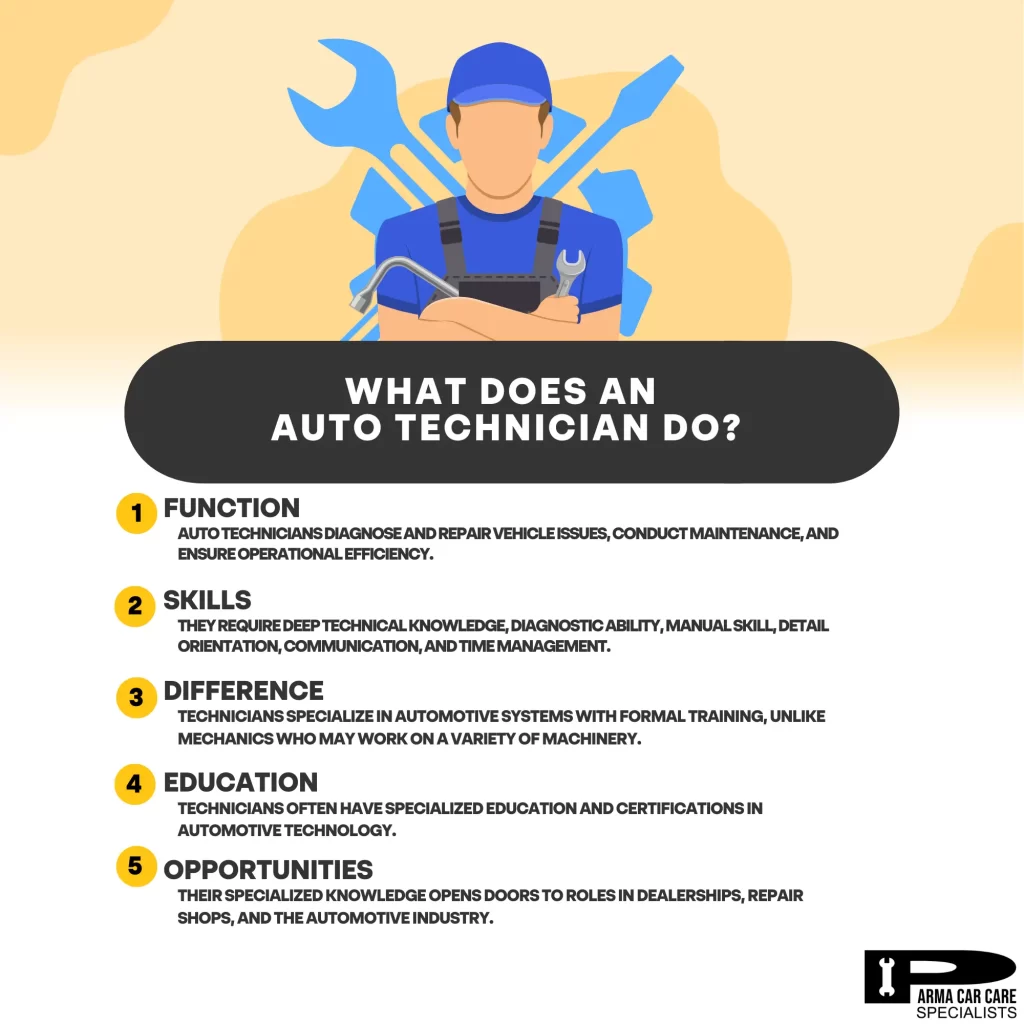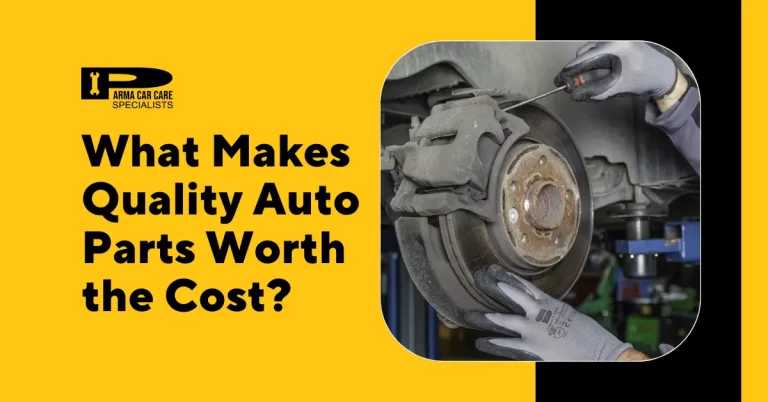When your car breaks down or needs maintenance, you entrust it to the skilled hands of an auto technician. But have you ever wondered what exactly they do? What goes on behind the scenes of a repair shop? In this blog post, we’ll take a closer look at the job of an auto technician, exploring their roles, responsibilities, and the technical expertise they bring to the table.
What is an Auto Technician?
When your car breaks down, you take it to an auto technician. They’re the ones who inspect, diagnose, and repair the issues that are keeping your car from running smoothly. Auto technicians are highly skilled professionals who work with complex machinery to ensure your vehicle is in top shape.
If you’re thinking of becoming an auto technician or are just curious about what they do, this blog post is for you. We’ll look closer at their job responsibilities, the skills they need, and the difference between an auto technician and a mechanic.
What Does an Auto Technician Do?
Auto technicians are trained to work on cars and trucks and even motorcycles. Their primary goal is to identify and fix any mechanical, electrical, or computer-related problems that a car may have. To do this, they perform the following tasks:
1. Inspecting and Diagnosing Issues
An auto technician starts by inspecting the vehicle to determine the root cause of the problem. They use diagnostic tools and their knowledge of automotive systems to identify issues accurately. This requires them to have a good understanding of how different parts of a vehicle work together.
2. Repairing and Replacing Parts
Once the problem has been identified, the auto technician will repair or replace the faulty parts. They are skilled in using various tools and equipment to perform these tasks efficiently. In some cases, they may need to order specific parts to ensure the proper functioning of the vehicle.
3. Conducting Routine Maintenance
In addition to repairs, auto technicians perform routine maintenance tasks like rotating tires, inspecting brake systems, and changing oil and filters, These preventive measures help in the overall longevity of the vehicle by identifying issues early on.
4. Testing and Quality Assurance
After completing the necessary repairs, auto technicians test the vehicle to ensure the problem has been resolved. They may take the car for a test drive or use specialized equipment to check for any remaining issues. This attention to detail is crucial in providing quality service to customers.
5. Keeping Records
Throughout the repair process, auto technicians maintain detailed records of their work. This includes the replaced parts, the repairs made, and any other relevant information. These records help provide a history of the vehicle’s maintenance and assist in future diagnostics if needed.
What are the Skills Required for an Auto Technician?
Becoming a successful auto technician requires combining a lot of skills and learning continuously. Here are some essential skills needed for this profession:
1. Technical Knowledge
First and foremost, auto technicians must have a firm grasp of the technical aspects of vehicle operation and repair. This includes understanding how different systems, such as engines, transmissions, and electrical components, work and being familiar with the latest advancements in automotive technology.
2. Diagnostic Skills
Being an effective auto technician means being an excellent problem solver. These professionals must be able to diagnose vehicle issues quickly and accurately. A keen eye on detail and the capacity to identify symptoms and trace them back to their root causes are crucial.
3. Manual Dexterity
Many of the tasks performed by auto technicians require good manual dexterity. They must be comfortable using various hand and power tools to disassemble and reassemble vehicle parts. Having steady hands and a knack for precise movements can significantly enhance their efficiency in executing repairs.
4. Attention to Detail
Repairing vehicles is meticulous, and auto technicians must pay close attention to detail. They must carefully follow instructions and ensure every component is correctly installed. Further problems or potential safety risks crop up when something important is overlooked.
5. Communication Skills
This is important in an auto technician. They must be able to listen actively to customers, understand their concerns, and explain complex technical concepts clearly and concisely. Good communication helps build trust with customers and ensure their expectations are met.
6. Time Management
Managing time effectively is essential for auto technicians, who often work on multiple vehicles with different repair needs. They must prioritize tasks, estimate repair times accurately, and work efficiently to deliver prompt customer service.
What is the Difference between an Auto Technician and a Mechanic?
The terms “auto technician” and “mechanic” are often used interchangeably, but there are slight differences between the two. While both professionals work in the automotive industry, their job scopes and areas of expertise can vary.
A mechanic is a broader term encompassing anyone skilled in repairing and maintaining machinery. They can work on various types of equipment, such as generators, construction machinery, and even household appliances. On the other hand, an auto technician specializes in working on automobiles.
Here’s a breakdown of the key differences between an auto technician and a mechanic:
1. Area of Focus
As mentioned earlier, mechanics can work on a wide range of machinery. At the same time, auto technicians limit their expertise to cars, motorcycles, and other road vehicles. The latter’s specialization allows them to have a deeper understanding of automotive systems, which have become increasingly complex with advanced technology.
2. Training and Certifications
Due to the specialized nature of their work, auto technicians typically undergo formal training at technical schools or community colleges. They may also pursue certifications specific to the automotive industry. In contrast, mechanics can acquire their skills through various means, such as on-the-job training or attending vocational courses.
3. Complexity of Work
Working on modern vehicles often requires advanced diagnostic and computer programming skills. This is where the expertise of auto technicians becomes crucial. They are trained to navigate complex automotive systems and effectively address the technical challenges posed by integrating electronics and computer controls in modern cars. Mechanics, on the other hand, generally handle more straightforward repairs and maintenance tasks.
4. Career Opportunities
The specialized training of auto technicians can open up opportunities to work in dealerships, specialized repair shops, and automotive manufacturing companies. They may also pursue careers as service advisors or technical trainers. Given their broader skill set, mechanics can find employment in various industries beyond automotive, including manufacturing and equipment rental companies.
Key Takeaway
Auto technicians play a vital role in the repair and maintenance of vehicles. They are skilled professionals who inspect, diagnose, and repair issues in different automotive systems. Their primary focus is ensuring that cars run smoothly and efficiently.
To become a successful auto technician, one must possess technical knowledge, diagnostic skills, and good manual dexterity. Attention to detail and effective customer communication are also essential in providing quality service.
Trust Your Car to the Experts at Parma Car Care!
Are you needing reliable auto repair services in Brooklyn Heights, OH? Look no further than Parma Car Care! Our team of skilled auto technicians is committed to providing top-notch repair and maintenance solutions. Call us today to schedule an appointment!

















